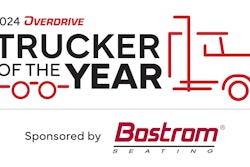RESTRICTIONS
When Mexican carriers begin operating in the United States, these restrictions will be in effect:
CARRIERS
TRUCKERS
TRUCKS
LAWSUIT FILED AFTER MEXICAN BORDER OPENS
After years of stalling, the United States has finally opened its border to Mexican carriers, drawing praise from the American Trucking Associations and condemnation from labor, environmental, state and independent trucking groups.
In November, President Bush modified the country’s moratorium on Mexican trucks and began processing the operating authority applications of carriers south of the border. The U.S. Department of Transportation has received 130 applications from Mexican-based truck and bus companies. Half of those are ready for the required safety audits.
The companies have applied for permission to move international cargo in cross-border services in the United States or provide regular routes between the two countries. The moratorium remains on Mexican carriers that wish to provide truck or bus service between American locations.
Last month, the Environmental Law Foundation, Public Citizen, the Teamsters and the California Trucking Association, among others, filed for an emergency stay from the Ninth Circuit Court of Appeals to prevent Mexican trucks from operating beyond the commercial border zone. They argue that U.S. regulations require a complete environmental review of the Mexican trucks’ impact on air quality before proceeding.
The Owner-Operator Independent Drivers Association has never supported the border opening, says Executive Vice President Todd Spencer. It is unclear what power American officials have over Mexican trucks, especially if they are stopped beyond the border area, he says. “The whole emphasis has been on the border states, yet the decision opens up the entire United States,” Spencer says.
Bush’s action is “great news for American industry,” says ATA President Bill Canary. Carriers who see profits south of the border are also applauding the move.
– Jill Dunn
TRUCK FATALITY RATE DECLINES AGAIN
The rate of truck-crash fatalities per 100 million vehicle miles traveled has reached its lowest point in two decades.
The DOT, which has kept large-truck safety records since 1975, says 2001 truck-related fatalities were 2.1 per 100 million miles traveled. That decrease coincides with a nearly 4 percent drop in the actual number of truck-related fatalities, regardless of miles traveled, which dropped in 2001 for the fourth consecutive year.
William Canary, president of the American Trucking Associations, says programs that educate the non-trucking public on sharing the road with trucks have helped improve safety. “We could save even more lives if we had stronger, visible enforcement of speed limits for all motorists,” he says. “Nearly 30 percent of all fatalities result from speed-related accidents, so it makes sense to focus here.”
Studies from the University of Michigan Transportation Research Institute and the AAA Foundation for Traffic Safety indicate that 75 percent of crashes between a car and truck are the result of the car driver’s error.
-Jill Dunn
CDS TO FEATURE TRUCKER MUSICIANS
Drivers and others in the trucking industry have a chance to apply for a recording project that will produce CDs for distribution at truck stops.
AmeriSearch Music Group and Omni Sound Studios of Nashville, Tenn., are searching for performing and song-writing talent within the transportation industry.
The search is part of a project through AMG’s Gear Jammer Records, a label launched for recording and distributing undiscovered singers and songwriters within the freight industry, says Marge Bailey, president and co-founder.
Five winners will be chosen from each search. They will travel to Omni Sound Studios to record two songs each. The songs will be included on one of AMG’s 10-song compilations.
The first talent audition will be held at the Mid-America Trucking Show in Louisville, Ky., March 20-22. Applicants need to complete a registration form and send it with a sample of their work (sheet music, audio tape, video, etc.) to AMG. Entries need to be received on or before Feb. 13. For more information, contact Gear Jammer Records at (989) 892-8433 or gearjammerrecords.com.
AMG’s first professional release is Kenny Robbins’ Greatest Hits, Vol. 1. Robbins, a former trucker, has been performing at truck stops and shows since 1995.
– Javacia N. Harris
LAWSUIT CALLS FOR ENACTMENT OF OVERDUE SAFETY RULES
Four organizations have petitioned a federal court to bring about issuance of truck safety rules they say are years overdue.
The petitioners on Nov. 26 filed for an order in the U.S. Circuit Court of Appeals for the Columbia Circuit to direct the U.S. Department of Transportation to address safety issues. Public Citizen, Citizens for Reliable and Safe Highways, Parents Against Tired Truckers and Teamsters for a Democratic Union said the Congress had passed several laws requiring the federal transportation department to issue final rules by a certain date. The department had not met those deadlines.
The groups want:
CONNECTICUT WANTS TO REVIVE TOLLS
A Connecticut group representing state municipalities wants to bring back highway tolls at five locations along the state’s boundaries. The group believes the state would raise $75 million to $125 million a year with tolls in North Stonington and Greenwich on I-95, Danbury and Union on I-84, and Enfield on I-91.
OFFICIAL SAYS TRAILER SECURITY SLACK
Only 20 to 30 percent of truckers lock their trailers, a problem U.S. transportation officials say is a big threat to homeland security.
George Rodriguez, cargo security director for the Transportation Security Administration, told shippers and carriers last month that the trucking industry is lax on this security issue and is resisting efforts to improve. He hopes to change the law and to give states authority to ticket truckers who leave trucks unlocked. Carriers are resistant to locking trailers because it reduces productivity, because they’ve never done it before, or because their trucks are always moving, Rodriquez said.
N.H. TRUCKERS SUE OVER TAX REVENUE
Truckers in New Hampshire are suing the state over how it spends its tax revenue from fuel purchases. The state’s Motor Transport Association is trying to stop the state from spending those funds on a passenger rail service. The state constitution prohibits using gasoline taxes for anything other than highway construction and maintenance.
The legislation is supported by the state’s outgoing and incoming governors and its U.S. Congressional delegation. Transportation officials in the state say a court decision would be helpful in clearing up the matter, considering that the state legislature on three occasions has defeated legislation that would allow fuel taxes to be diverted for other projects.
Annette Sandberg, former chief of the Washington State Patrol, is the interim replacement for Joseph Clapp, head of FMCSA.
HOURS REFORM ON TAP AS FMCSA HEAD DEPARTS
Before Joseph Clapp, administrator of the Federal Motor Carrier Safety Administration, stepped down at year-end after 15 months on the job, he tied up some unfinished business: reviving reform of the 60-year-old hours-of-service rule.
Clapp will be replaced, at least temporarily, by Annette Sandberg, a nationally recognized expert on law enforcement and traffic safety.
A DOT spokesperson confirmed in December that a new hours proposal was headed to the White House. FMCSA has been working on the proposal for the past year with an independent contractor who has been developing the cost-benefit and small business administration analyses, the spokesperson said.
Hours-of-service reform must clear the White House Office of Management and Budget, then go through a public comment period and any necessary amendments before the old rule is scrapped. The last reform effort, in 2000, received no support from the trucking industry and was eventually sidelined.
Since his appointment at FMCSA, Clapp focused on meeting transportation safety requirements for implementing the truck and bus provisions of the North American Free Trade Agreement. Regulations published while Clapp was administrator included a final rule that strengthened the licensing requirements and sanctions in the commercial driver’s license program. Another rule established a new safety audit process for U.S. and Canadian motor carriers entering the market after Jan. 1.
Sandberg served as deputy administrator of the department’s National Highway Traffic Safety Administration before her promotion. She may be nominated eventually to replace Clapp as administrator, a DOT spokesperson said.
Sandberg spent more than 17 years in law enforcement, supervisory and administrative posts – some of which included responsibility for motor carrier safety – with the Washington State Patrol. She was patrol chief for six years.
ACCIDENTS PROMPT SAFETY MEASURES
New Jersey officials have taken steps to improve highway safety following a spurt of highway fatalities involving trucks.
State Transportation Commissioner Jamie Fox says that the efforts, including installing highway barriers and electronic warning signs, were the result of meetings that followed high-profile accidents.
“One of the ways to improve safety is to teach drivers to share the road with other cars and trucks,” Fox says. “We must also ensure that trucks are safe to operate on our roads with regular inspections. Lastly, we must have a significant police presence on our roads to ensure drivers are in compliance with traffic safety laws.”
Electronic driver warning signs were placed throughout the state and the state’s Emergency Service Patrol expanded its service to parts of I-78. The state Department of Transportation planned to put barriers on I-78 in Whitehouse Station and on I-80 in Roxbury Township.
State government groups are working with the New Jersey Motor Truck Association to expand the Share the Road Program to at least 50 schools.
Also, signs were to be installed along interstates asking drivers to report aggressive or erratic driving. Real-time traffic information and photographs on major state routes will be added to the NJDOT website, www.state.nj.us/transportation.
State officials will also do more mobile truck inspections, according to published reports.
– Jill Dunn
TRUCK GROUPS SUE OVER DELAWARE RIVER TOLLS
Two state trucking groups, a carrier and the American Trucking Associations have filed suit against the Delaware River Joint Toll Bridge Commission over a four-fold toll increase.
“The Commission just doesn’t get it,” says William Canary, ATA president and CEO. “A 180 percent increase the first year and a 300 percent increase thereafter will significantly raise freight transportation costs that will worsen the challenging economic conditions already faced by the region.”
ATA joined the New Jersey Motor Truck Association and Pennsylvania Motor Truck Association as well as Roadway Express in the suit, which seeks to reverse toll increases of more than $12 for the average 18-wheeler.
Commission members originally approved a 400 percent increase to begin in late November on seven bridges. But the bi-state commission voted in November to use a gradual approach instead. A five-axle truck that paid $4 to cross one of these bridges in November now pays $11.25. That will increase to $16.25 by January 2004.
The affected bridges include I-78, Route 1 Trenton-Morrisville, Route 202 New Hope-Lambertville, Route 22 Easton-Phillipsburg, Portland-Columbia, I-80 Delaware Water Gap and Milford-Montague.
The suit protests the tolls as “unreasonable and unjust” and in violation of federal law, says New Jersey MTA Executive Director Gail Toth.
Roadway, with terminals that include a large facility in Stroudsburg, Pa., would have to pay $500,000 more annually in tolls, she says. The non-trucking public, whose rates will rise from 20 or 25 cents to $1.25, has also protested the hike, she says.
The extra revenue is to fund a 10-year, $526 million improvement plan for the 20 commission bridges. Toll rates last changed for commuters in 1982 and for trucks in 1988. Toth says she was particularly outraged over the commission’s $416,750 advertising campaign to announce the toll hikes.
– Jill Dunn
DOCKWORKERS, SHIPPERS MOVE TOWARD PACT
West Coast dockworkers and shipping companies have reached a tentative six-year contract that should avoid a second costly shutdown of West Coast ports.
The International Longshore and Warehouse Union called the agreement with the Pacific Maritime Association, which represents shippers and port employees, a victory for its 10,500 members, who were voting on the measure at press time.
“We worked in good faith with the PMA and succeeded in bringing new technology to our ports while achieving vital pension and economic security, strong health care benefits and safety protections for our workers and their families,” Union President James Spinosa says.
PMA joined President Bush in applauding the agreement as “good for workers, for employers, and it’s good for the American economy.”
The union says the contract secures pension protection, increased wages, better health care benefits and new safety provisions. Shippers will be able to introduce technology, which had been a point of dispute with the union because it feared it would eliminate jobs.
The two sides negotiated for a new contract after the old one expired July 1, but a spat over negotiations and a work slowdown led to a nasty 10-day port shutdown that idled thousands of truckers and cost some owner-operators hundreds of dollars a day. Bush eventually invoked the Taft-Hartley Act, which reopened ports for 80 days while negotiations continued.
– Jill Dunn
The museum’s grand opening is planned for 2005.
IOWA 80 TRUCKSTOP TO OPEN MUSEUM
Iowa 80 Truckstop has begun foundation work for a Trucking Hall of Fame within walking distance of the truck stop in Walcott, says Delia Moon Meier, whose family owns Iowa 80. The museum’s grand opening is planned for 2005.
The Trucking Hall of Fame, with 21,600 square feet, will have a gift shop and will be able to display 27 trucks and to store other trucks. There will be a full-time restoration expert on staff, allowing visitors to view truck restorations in progress.
“My father loved trucks and trucking,” says Meier of Bill Moon, who died in 1992. “He collected several antique trucks, antique toy trucks and other trucking memorabilia. This is going to be a great way for us to share that with others.”
The Moon family’s collection of over 100 trucks and trailers will be the main source for the museum. Among its pieces are a 1910 Avery, a 1961 B-61 Mack that is the first Mack AC ever produced, a 1924 White wrecker featured in the movie Fried Green Tomatoes, a rare half-cab Kenworth, a 1912 Saurer and a 1934 GMC truck and trailer.
– Max Heine
SHORT HAULS
FEDERAL OFFICIALS will evaluate a radiation detection system being installed at Knoxville, Tenn.’s I-40 eastbound weigh station for possible use on other interstates as a security measure. The technology detects slight levels of gamma radiation in loads as trucks pass between yellow steel girders. The additional clearance is not expected to add wait time.
TWO FEDERAL AGENCIES have launched a program to fund business initiatives for enhancing security for container cargo. Operation Safe Commerce, which will be run by the Department of Transportation and the Customs Service, will seek to identify vulnerabilities in the supply chain and to improve methods for ensuring the security of cargo entering and leaving the country.
Over-the-road driving might not be conducive to good health, but you can still do your part with diet and exercise to stay fit. Read January’s MONTHLY FOCUS on eTrucker.com for tips and insight into how you can take care of your body.
TRUCKER HOYT WEBB of Tupelo, Miss., recently won $1,000 in the eTrucker.com monthly Money for Miles contest.
CUMMINS INC. has received orders from more than 140 fleets for its new engines, which meet new federal emissions standards. Several fleets have ordered more than 100 engines, including Knight Transportation, P.A.M. Transport and Tyson Foods, said Cummins Vice President Jeff Jones.
J.B. HUNT Transport Services has signed an agreement with Freightliner for the sale of 2,100 trucks. The carrier will buy a variety of truck and engine types in a one-for-one trade, according to Hunt. About 450 truck additions to the fleet that had been delayed until 2003 will be postponed to 2004.
E-ZPASS is now available to commercial vehicles traveling the Pennsylvania Turnpike. Companies already enrolled in E-ZPass through another agency can open a companion account and use the Turnpike’s volume discounts. The existing commercial charge card program will operate until the turnpike has E-ZPass available on all of its roads. Commercial vehicle customers may enroll in the program at www.paturnpike.com or by calling (877) PENNPASS.
THE FEDERAL MARITIME COMMISSION was petitioned by the Association of Bi-State Motor Carriers to investigate the practices of some New York Terminal Conference members. The group’s petition involves truck detention at three terminals in the Port Newark/Elizabeth area of New Jersey. It charges that some conference members have violated regulations, including not compensating truckers for excessive waiting time.
TRIPPAK EXPRESS parent company TMI installed document drop boxes at all TravelCenters of America locations, said Mark Cleveland, TMI executive vice president. TA will incorporate TMI bar codes into its fuel tickets to facilitate accurate image capture and decrease costs for carriers that use the integrated TripPak Online.
CON-WAY Transportation Services will introduce an $8 security surcharge this month on northbound and southbound shipments crossing the U.S.-Canada border. The surcharge stems from costs associated with increased security measures at the border, which lengthen the time it takes for border crossing.




